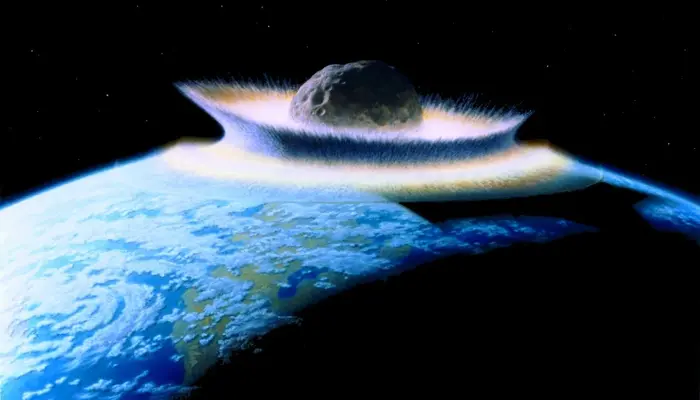A 500-meter asteroid impact could trigger a devastating “impact winter,” bringing extreme cooling, food shortages, and environmental upheaval. However, a surprising outcome emerges from the ocean—plankton could thrive, potentially balancing some of the disaster’s effects. Scientists at the IBS Center for Climate Physics modeled this scenario, revealing how Earth’s climate and ecosystems might respond.
Catastrophic Cooling and Food Crisis
Researchers used advanced climate modeling to simulate the aftermath of an asteroid strike. Their findings suggest that an impact of this scale would inject hundreds of millions of tons of dust into the atmosphere, drastically reducing sunlight.
- Global temperatures would drop by 4°C (7.2°F).
- Rainfall could decrease by 15%, leading to widespread drought.
- Ozone depletion might reach 32%, exposing life to harmful UV radiation.
These changes would devastate agriculture. Land-based photosynthesis could decline by up to 30%, causing a global food crisis. Crops would struggle, ecosystems would collapse, and mass starvation could follow.
Read: DeepSeek vs ChatGPT – What You Need to Know
The Ocean’s Surprising Response
While the land would suffer, ocean life might see an unexpected boom. Researchers found that iron-rich asteroid dust could act as a fertilizer, promoting massive plankton blooms.
- Plankton recovery could begin within six months, far faster than land-based plants.
- Marine productivity might surpass pre-impact levels, benefiting species higher in the food chain.
- The biggest growth would occur in nutrient-poor areas like the Southern Ocean and tropical Pacific.
These findings suggest that past asteroid impacts may have shaped ocean ecosystems and even influenced human evolution by altering food sources.
Asteroid Bennu: A Future Threat?
The study also highlights asteroid Bennu, a 500-meter-wide space rock with a 1-in-2,700 chance of striking Earth in September 2182. While the probability is low, researchers stress the importance of impact preparedness.
Using the IBS supercomputer Aleph, scientists simulated a Bennu-like impact. The results confirm that such a collision would disrupt climate patterns, damage agriculture, and threaten global stability. However, it would also spark marine life expansion, offering a potential lifeline in an otherwise bleak scenario.
Could Plankton Blooms Offset the Crisis?
Despite the destruction, the plankton boom could provide a temporary food source for marine species. This might help stabilize ocean ecosystems and offer alternative nutrition sources for humans.
“These excessive phytoplankton and zooplankton blooms might be a blessing for the biosphere,” says Dr. Lan Dai, lead author of the study. “They could counterbalance some of the terrestrial food shortages.”
Past Impacts and Human Evolution
Asteroids have hit Earth roughly every 100,000 to 200,000 years, meaning our ancestors likely endured similar events. Scientists now plan to explore how these past impacts shaped human survival and genetic evolution.
By studying ancient disasters, researchers hope to predict how future asteroid strikes might alter Earth’s environment—and whether humanity could adapt to a changing planet.
Follow us on Google News, Instagram, YouTube, Facebook,Whats App, and TikTok for latest updates
